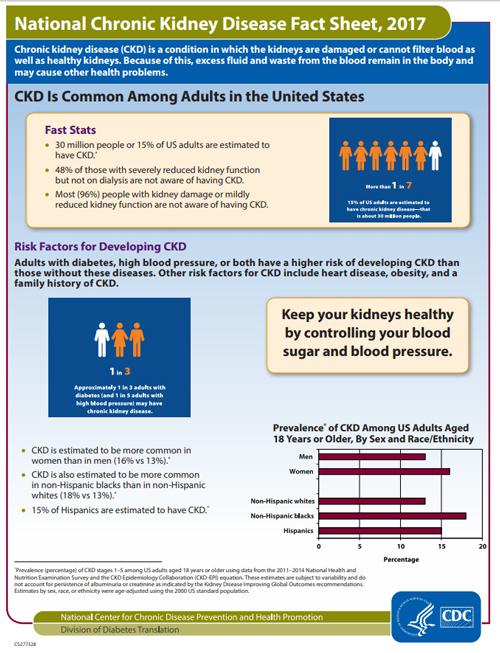Behind the scenes, your kidneys are quietly filtering 200 liters of blood each and every day. Many of us don’t even think about the work the kidneys are doing, but for the nearly 600,000 people in the U.S. who have kidney failure, kidney function is a daily concern. [1]
So on Mar. 8, join Horizon Family Medical Group in celebrating World Kidney Day. Make an appointment to come in and get screened:
- Horizon Family Nephrology – Goshen, NY – 845-294-0994
- Horizon Family Nephrology – Newburgh, NY – 845-565-8022
How prevalent is kidney disease?
According to Kidney.org, “more than 30 million Americans have kidney disease, and most don’t know it.” [1] In fact, chronic kidney disease can sometimes go undetected until the disease is very advanced. [2]
What are the stages of kidney disease?
The National Institute of Diabetes and Digestive and Kidney Diseases (NIDDK) outlines the five different stages of chronic kidney disease. [2] According to the NIDDK, the five stages are broken down by how much your kidneys are filtering—called the Glomerular Filtration Rate (GFR). The less your kidneys filter (or the lower the GFR), the closer you get to stage 5, or end-stage renal disease. Here’s how the NIDDK breaks it down:
- Stage 1: Kidney damage with normal kidney function (estimated GFR ≥90 mL/min per 1.73 m2) and persistent (≥3 months) proteinuria.
- Stage 2: Kidney damage with mild loss of kidney function (estimated GFR 60-89 mL/min per 1.73 m2) and persistent (≥3 months) proteinuria.
- Stage 3: Mild-to-severe loss of kidney function (estimated GFR 30-59 mL/min per 1.73 m2).
- Stage 4: Severe loss of kidney function (estimated GFR 15-29 mL/min per 1.73 m2).
- Stage 5: Kidney failure requiring dialysis or transplant for survival. Also known as ESRD (estimated GFR <15 mL/min per 1.73 m2).
How do they treat kidney disease?
Your doctor will walk you through the treatment options based on the cause of your kidney disease and the symptoms you experience. Unfortunately, in most cases, chronic kidney disease doesn’t have a cure, so the treatments may be to control or slow how quickly the disease progresses.
According to the Mayo Clinic, your doctor may prescribe medications to help control your blood pressure, cholesterol, anemia, and swelling. If you reach end-stage kidney disease, your doctor will talk with you about dialysis—the use of a machine to filter your blood—and possible kidney transplant options. [3]
Get a kidney disease fact sheet
The Centers for Disease Control and Prevention (CDC) put together a great fact sheet you can print and share with friends and family to raise awareness of kidney health and encourage loved ones to get screened. [4]
Resources:
- https://www.kidney.org/news/monthly/Focus_KidneyMonth
- https://www.niddk.nih.gov/health-information/health-statistics/kidney-disease
- https://www.mayoclinic.org/diseases-conditions/chronic-kidney-disease/diagnosis-treatment/drc-20354527
- https://www.cdc.gov/kidneydisease/pdf/kidney_factsheet.pdf


